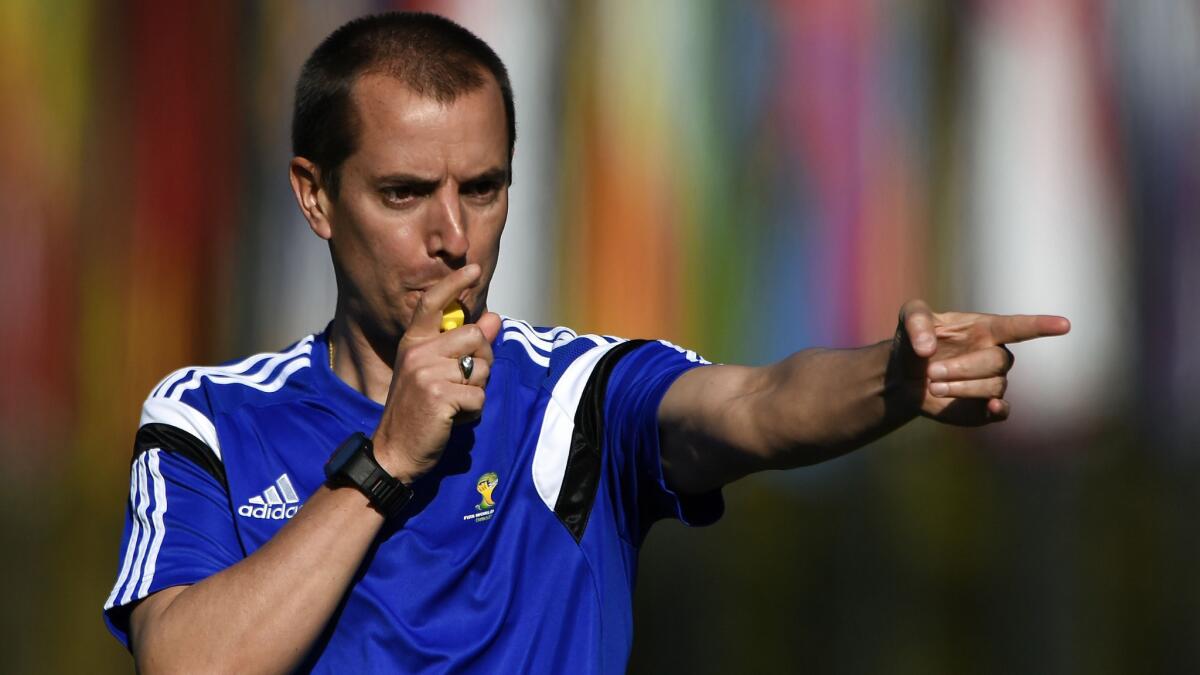U.S. referee Mark Geiger scores World Cup assignment

One of the first things Mark Geiger was given after being selected as a referee for this summer’s World Cup was a plane ticket home from Brazil.
Talk about a blow to your confidence. The tournament kicks off next week and Geiger, the first U.S. referee selected for a World Cup since 2002, doesn’t know where or when he’ll work his first game. But he knows when and on which flight FIFA plans to send him home.
Few jobs are more meritocratic than that of a World Cup referee. Only 25 are chosen from a pool of thousands and they are guaranteed only one game. Do well and you get another game, and your trip home gets rebooked.
Do poorly and you get a ride to the airport.
By the final there’s one referee left standing. Four years ago it was England’s Howard Webb, whose work was watched by more than 900 million TV viewers, making him the most famous sports official in the world.
“It could happen, I suppose,” Geiger said of his chances of lasting to the championship game. “Coaches, players, they all dream of having the final. That’s what we’re working towards and we’re going to work very hard in order to accomplish that.
“But if we don’t perform well in that very first game, there’s no possibility of us getting the final. So all of our energy and focus is going to be on that first game. And then we take it from there.”
Just getting this far has proved to be a survival of the fittest, literally, for the 25 referees summoned to the tournament. Because in addition to proving they know the rules and can manage a game, prospective World Cup officials must also pass a series of challenging physical tests, including a 21/2-mile interval run and sprinting 40 meters in 5.9 seconds or less.
Unlike other sports, where conditioning for officials isn’t considered as important (here’s looking at you baseball) it is vital in soccer, where referees can cover eight miles during a typical game, much of it in short bursts. During the 2012-13 English Premier League season, referees averaged 176 high-speed runs, defined as faster than 121/2 mph, per game, one more than the players averaged.
“We’re moving a lot like a midfielder would move,” Geiger said. “We’re covering end to end, goal line to goal line, touch line to touch line. And we do focus on very specific things as well.
“One of the things I’ve been working on is my first step. And my explosiveness. And my sprints. So we do work on very specific parts of fitness as well.”
Geiger was Major League Soccer’s referee of the year in 2011, is the only American to have officiated the final of a FIFA U-20 World Cup and also worked two games in the 2012 London Olympics. But for all his obvious talents, Geiger began calling games only because he could no longer play in them.
“I was getting a lot of injuries and I certainly wasn’t good enough to go on and play at college. So refereeing was just a way to keep me active in the sport and keep me on the field with these players,” said Geiger, who officiated his first game when he was 14.
Geiger, 39, said he “had no clue” he was any good even as he was receiving positive evaluations and being quickly promoted through the youth ranks. Before he turned 30, he was refereeing MLS games and in 2008 became FIFA listed, the highest ranking a soccer official can achieve.
“I just kept focusing on the short-term goals to reach those long-term ones. And here I am,” Geiger said. “My head was spinning a couple of times when things would happen very quickly. You plateau for a little bit, continue to work, and then all of a sudden you move forward again.”
In Brazil he’ll be heading an officiating team that includes assistant referees Sean Hurd of the U.S. and Joe Fletcher of Canada. Their first game, whenever and wherever it winds up being, will make history because it will mark the first time two U.S. officials worked together in a World Cup game.
“I think it’s great,” said Galaxy Coach Bruce Arena, who coached the U.S. in two World Cups. “They need to step up at the world level and get respect. Everyone has the greatest respect for referees from Europe. And it’s time now that our region and our country gets some of that as well.
“Having Mark and his crew there is going to help.”
Part of the credit for the World Cup assignment should probably go to the 2-year-old Professional Referees Organization (PRO), which has professionalized soccer officiating in the U.S. and Canada, partly by providing salaries for the top 20 referees and 49 assistant referees, allowing them to focus on officiating full time.
For Geiger that meant leaving the classroom, where he had also excelled, winning a Presidential Award for Excellence as a high school math teacher in New Jersey. The two jobs, he says, are a lot more similar then people might imagine.
“In the classroom you’re dealing with 25 to 30 students, all with different personalities and different learning styles. Same thing with the players,” he said. “You have 22 players with different personalities and different ways to manage them. You want to get your point across to the players and get something out of them when you communicate with them or give them a yellow card. And how you approach one player is going to be different than another.
“So it’s very similar to teaching in that aspect.”
Which is among the reasons why Geiger intends to return to the classroom some day. Although there are no age restrictions for its MLS officials, FIFA has a mandatory retirement age of 45, which Geiger will hit shortly after the next World Cup.
“I’m hoping to be able to do this for 10 more years, as long as the body holds out,” he said. “We just focus on that next game that we have. You’re only as good as your last game and your last decision.”







